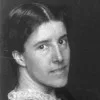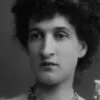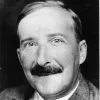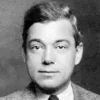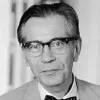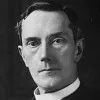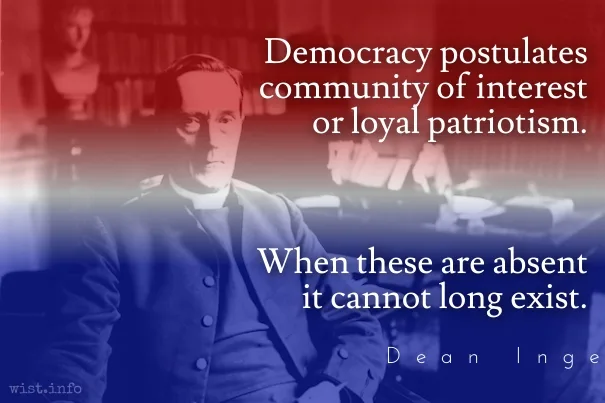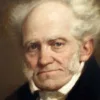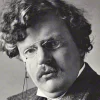Nations, like individuals, do not always see alike or think alike, and international cooperation and progress are not helped by any Nation assuming that it has a monopoly of wisdom or of virtue.
Franklin Delano Roosevelt (1882-1945) American lawyer, politician, statesman, US President (1933-1945)
Message (1945-01-06) to Congress, Annual Message (State of the Union)
(Source)
In 1945, Roosevelt delivered the SOTU as a written message to Congress, not as a speech.
Quotations about:
nationalism
Note not all quotations have been tagged, so Search may find additional quotes on this topic.
PATRIOTISM, n. Combustible rubbish ready to the torch of any one ambitious to illuminate his name. In Dr. Johnson’s famous dictionary patriotism is defined as the last resort of a scoundrel. With all due respect to an enlightened but inferior lexicographer I beg to submit that it is the first.
Ambrose Bierce (1842-1914?) American writer and journalist
“Patriotism,” The Devil’s Dictionary (1911)
(Source)
See Johnson. See Bierce's definition of "Patriot."
Originally published in the "Cynic's Word Book" column in the New York American (1904-12-26) and the "Cynic's Dictionary" column in the San Francisco Examiner (1904-01-03).
PATRIOT, n. One to whom the interests of a part seem superior to those of the whole. The dupe of statesmen and the tool of conquerors.
Ambrose Bierce (1842-1914?) American writer and journalist
“Patriot,” The Devil’s Dictionary (1911)
(Source)
Originally published in the "Cynic's Word Book" column in the New York American (1904-12-26) and the "Cynic's Dictionary" column in the San Francisco Examiner (1904-01-03).
Those newspaper versions also included:A person whose zeal for the defense of his country’s altars and fires is not inconsistent with a fierce desire to cross the border to overturn the altars and extinguish the fires of another land.
See Bierce's definition of "Patriotism."
Patriotism, red hot, is compatible with the existence of a neglect of national interests, a dishonesty, a cold indifference to the suffering of millions. Patriotism is largely pride, and very largely combativeness. Patriotism generally has a chip on its shoulder.
Charlotte Perkins Gilman (1860-1935) American sociologist, writer, reformer, feminist
Herland, ch. 8 (1915)
(Source)
Something, some psychological vitamin, is lacking in modern civilization, and as a result we are all more or less subject to this lunacy of believing that whole races or nations are mysteriously good or mysteriously evil.
George Orwell (1903-1950) English writer [pseud. of Eric Arthur Blair]
Essay (1945-04), “Antisemitism in Britain,” Contemporary Jewish Record
(Source)
Written February 1945.
Nationality is a Janus, facing both ways. So far as it stands for the right of a people to govern itself, it stands for freedom. So far as it stands for the ambition to govern other people, or to destroy them, or to shape them into an alien world, it stands for domination. Throughout history it has stood for both.
G. Lowes Dickinson (1862-1932) British political scientist and philosopher [Goldsworthy "Goldie" Lowes Dickinson]
“The War and the Way Out: A Further Consideration,” sec. 3, Atlantic Monthly (1915-04)
(Source)
Cowardice or Bravery is never racial. You find both in every Country. No country has a monopoly on Bravery; great deeds of heroism is liable to break out in the most unexpected places.
Will Rogers (1879-1935) American humorist
“Letter of a Self-Made Diplomat to His President,” Saturday Evening Post (1932-03-12)
Collected in More Letters of a Self-Made Diplomat to His President (1928) [ed. Steven Gragert].
There’s a great deal to be said for nationalism, for keeping diversity — in literature, in art, in language, and in all kinds of cultural things. But when it comes to politics, I think nationalism is an unmitigated evil. I don’t think there’s a single thing to be said in its favor.
Bertrand Russell (1872-1970) English mathematician and philosopher
Interview by Woodrow Wyatt, BBC TV (1959)
Collected in Bertrand Russell's BBC Interviews (1959) [UK] and Bertrand Russell Speaks His Mind (1960) [US]. Reprinted (abridged) in The Humanist (1982-11/12), and in Russell Society News, #37 (1983-02).
In fact the state is primarily an organization for killing foreigners, that’s its main purpose. There are, of course, other things they do. They do a certain amount of educating, but, in the course of educating you, try very hard to make the young think it is a grand thing to kill foreigners.
Bertrand Russell (1872-1970) English mathematician and philosopher
Interview by Woodrow Wyatt, BBC TV (1959)
Collected in Bertrand Russell's BBC Interviews (1959) [UK] and Bertrand Russell Speaks His Mind (1960) [US].
Prejudice in favour of one’s own country, combined with national pride, makes us forget that reason is found in every land, and sound thoughts wherever there are men. We should not like to be thus treated by those whom we call barbarians; and if we ourselves display a certain barbarism, this consists in being panic-stricken at seeing men of another nation reason as we do ourselves.
[La prévention du pays, jointe à l’orgueil de la nation, nous fait oublier que la raison est de tous les climats, et que l’on pense juste partout où il y a des hommes. Nous n’aimerions pas à être traités ainsi de ceux que nous appelons barbares; et s’il y a en nous quelque barbarie, elle consiste à être épouvantés de voir d’autres peuples raisonner comme nous.]
Jean de La Bruyère (1645-1696) French essayist, moralist
The Characters [Les Caractères], ch. 12 “Of Opinions [Des Jugements],” § 22 (12.22) (1688) [tr. Stewart (1970)]
(Source)
(Source (French)). Alternate translations:Our prepossession in favour of our Country, join'd to the pride of our Nation, makes us forget that Reason belongs to all Climates, and just Thoughts to all places where there are Men. We should not like to be so treated by those we call Barbarians; if amongst us there is any barbarity, it is in being amaz'd at the hearing other People reason like our selves.
[Curll ed. (1713)]Our Prepossession in the Favour of our Country, joined to a national Pride, makes us forget that Reason is the Growth of all Climates, and that a Justness of Sentiment is not limited to a Part of Europe: It would enrage us to be so treated by those whom we are pleased to call Barbarians; if amongst us there is any Barbarism, 'tis in being amazed at hearing other People reason like ourselves.
[Browne ed. (1752)]Our prepossession in favour of our native country and our national pride makes us forget that common sense is found in all climates, and correctness of thought wherever there are men. We should not like to be so treated by those we call barbarians; and if some barbarity still exists amongst us, it is in being amazed on hearing natives of other countries reason like ourselves.
[tr. Van Laun (1885)]
Modern wars are seldom fought without hatred between nations; this serves as a more or less substitute for the hatred between individuals. Even when there is no natural hatred and no animosity to start with, the fighting itself will stir up hostile feelings: violence committed on superior orders will stir up the desire for revenge and retaliation against the perpetrator rather than against the powers that ordered the action. It is only human (or animal, if you like), but it is a fact.
[Der Nationalhaß, an dem es auch bei unseren Kriegen selten fehlt, vertritt bei dem einzelnen gegen den einzelnen mehr oder weniger stark die individuelle Feindschaft. Wo aber auch dieser fehlt und anfangs keine Erbitterung war, entzündet sich das feindselige Gefühl an dem Kampfe selbst, denn eine Gewaltsamkeit, die jemand auf höhere Weisung an uns verübt, wird uns zur Vergeltung und Rache gegen ihn entflammen, früher noch, ehe wir es gegen die höhere Gewalt sein werden, die ihm gebietet, so zu handeln. Dies ist menschlich oder auch tierisch, wenn man will, aber es ist so.]
Karl von Clausewitz (1780-1831) Prussian soldier, historian, military theorist
On War [Vom Kriege], Book 2, ch. 2 “On the Theory of War [Über die Theorie des Krieges],” § 17 (2.2.17) (1832) [tr. Howard & Paret (1976)]
(Source)
(Source (German)). Alternate translations:National hatred, which is seldom wanting in our wars, is a substitute for personal hostility in the breast of individual opposed to individual. But where this also is wanting, and at first no animosity of feeling subsisted, a hostile feeling is kindled by the combat itself; for an act of violence which any one commits upon us by order of his superior, will excite in us a desire to retaliate and be revenged on him, sooner than on the superior power at whose command the act was done. This is human, or animal if we will; still it is so.
[tr. Graham (1873)]National hatred, which is seldom lacking in our wars, becomes a more or less powerful substitute for personal hostility of individual against individual. But where this also is wanting, and, at first, no animosity existed, a hostile feeling is kindled by the combat itself. An act of violence which anyone commits upon us by order of his superior will excite in us the desire to retaliate and be revenged on him sooner than on the superior power at whose command the act was done. This is human -- animal, if you will -- but it is a fact.
[tr. Jolles (1943)]
It always will seem funny to us United Staters that we are about the only ones that really know how to do everything right. I don’t know how a lot of these other Nations have existed as long as they have till we could get some of our people around and show ’em really how to be Pure and Good like us.
Will Rogers (1879-1935) American humorist
“Letter of a Self-Made Diplomat to His President,” Saturday Evening Post (1932-02-27)
(Source)
Collected in More Letters of a Self-Made Diplomat to His President (1928) [ed. Steven Gragert].
The truth is often painful and disturbing. Hence if you stick to unalloyed reality, few people will follow you. An American presidential candidate who tells the American public the truth, the whole truth and nothing but the truth about American history has a 100 percent guarantee of losing the elections. The same goes for candidates in all other countries. How many Israelis, Italians or Indians can stomach the unblemished truth about their nations? An uncompromising adherence to the truth is an admirable spiritual practice, but it is not a winning political strategy.
Yuval Noah Harari (b. 1976) Israeli public intellectual, historian, academic, writer [יובל נח הררי]
“Why Fiction Trumps Truth,” New York Times (24 May 2019)
(Source)
All of nationalism can be understood as a kind of collective narcissism.
Geoff Mulgan (b. 1961) British academic, bureaucrat, policy advisor, journalist
“Because You’re Worth It,” The Guardian (12 Jun 2006)
(Source)
To foreign climes a man must sometimes roam,
In quest of things he cannot find at home;
For Frenchmen Germans have no strong affection,
But to their wines we seldom make objection.[Man kann nicht stets das Fremde meiden
Das Gute liegt uns oft so fern.
Ein echter deutscher Mann mag keinen Franzen leiden,
Doch ihre Weine trinkt er gern.]Johann Wolfgang von Goethe (1749-1832) German poet, statesman, scientist
Faust: a Tragedy [eine Tragödie], Part 1, sc. 8 “Auerbach’s Cellar,” l. 2270ff [Brander] (1808-1829) [tr. Blackie (1880)]
(Source)
Some translations (and this site) include the Declaration, Prelude on the Stage, and Prologue in Heaven as individual scenes; others do not, leading to their Part 1 scenes being numbered three lower.
(Source (German)). Alternate translations:We can't quite shun the Foreign, howe'er we may determine;
The Good is oft so far away.
Your Frenchman's poison to your true-born German,
But your French wines he'd drink all day.
[tr. Latham (1790)]What's foreign we can't always shun,
So far from us must good things often be.
A genuine German can't abide the French, not one,
But of their wines he drinks most cheerfully.
[tr. Priest (1808)]One cannot always avoid what is foreign; what is good often lies so far off. A true German cannot abide Frenchmen, but willingly drinks their wines.
[tr. Hayward (1831)]What foreign is one always can't decline,
What's good is often scatter'd far apart.
The French your genuine German hates with all his heart,
Yet has a relish for their wine.
[tr. Swanwick (1850)]Hankerings for foreign things will sometimes haunt you,
The good so far one often finds;
Your real German man can't bear the French, I grant you,
And yet will gladly drink their wines.
[tr. Brooks (1868)]What's foreign one can't always keep quite clear of,
For good things, oft, are not so near;
A German can't endure the French to see or hear of,
Yet drinks their wines with hearty cheer.
[tr. Taylor (1870)]Sometimes one can't abstain from foreign stuff,
what is good lies often far away.
A German of fine blood dislikes the French,
but he enjoys their wines the better.
[tr. Salm (1962)]One can't become one country's henchman,
Much good hails from a distant spot;
Your proper German can't abide a Frenchman,
But likes French vintages a lot.
[tr. Arndt (1976)]You can't always avoid what's foreign,
About pleasure I'm not partisan.
A man who's a true German can't stand Frenchmen,
But he can stand their wine, oh yes he can!
[tr. Greenberg (1992)]You must admit sometimes, I know it's sad,
But foreign stuff is really not that bad.
Us Germans just can't stand the Frogs, but then
We like to drink their wine now and again.
[tr. Williams (1999)]We can’t always shun what’s foreign,
Things from far away are often fine.
Real Germans can’t abide a Frenchman,
And yet they gladly drink his wine.
[tr. Kline (2003)]
It is not often that you can say a political conviction coincides with a religious belief; but I think to look upon foreigners as enemies and try and draw a tight string round ourselves and our possessions to keep them out, is not only profoundly anti-Christ but contrary to all wisdom.
Margot Asquith (1864-1945) British socialite, author, wit [Emma Margaret Asquith, Countess Oxford and Asquith; Margot Oxford; née Tennant]
More or Less about Myself, ch. 11 (1934)
(Source)
Fascist politics includes many distinct strategies: the mythic past, propaganda, anti-intellectualism, unreality, hierarchy, victimhood, law and order, sexual anxiety, appeals to the heartland, and a dismantling of public welfare and unity.
Jason Stanley (b. 1969) American philosopher, epistemologist, academic
How Fascism Works: The Politics of Us and Them, Introduction (2018)
(Source)
Patriotism without principle is the prejudice of birth — the animal attachment to place.
Robert Green Ingersoll (1833-1899) American lawyer, agnostic, orator
Decoration Day Speech, Academy of Music, New York City (29 May 1882)
(Source)
The pull of fascist politics is powerful. It simplifies human existence, gives us an object, a “them” whose supposed laziness highlights our own virtue and discipline, encourages us to identify with a forceful leader who helps us make sense of the world, whose bluntness regarding the “undeserving” people in the world is refreshing. […] Fascist politics preys on the human frailty that makes our own suffering seem bearable if we know that those we look down upon are being made to suffer more.
Jason Stanley (b. 1969) American philosopher, epistemologist, academic
How Fascism Works: The Politics of Us and Them, ch. 10 (2018)
(Source)
Fascist politics feeds off the sense of aggrieved victimization caused by loss of hierarchal status. Empires in decline are particularly susceptible to fascist politics because of this sense of loss. It is in the very nature of empire to create hierarchy; empires legitimize their colonial enterprises by the myth of their own exceptionalism. In the course of decline, the population is easily led to a sense of national humiliation that can be mobilized in fascist politics to serve various purposes.
Jason Stanley (b. 1969) American philosopher, epistemologist, academic
How Fascism Works: The Politics of Us and Them, ch. 5 (2018)
(Source)
American society has always exercised a stronger pressure on individual behavior than Western European societies; but in time of war this pressure is notched a few degrees, and starts to become quite alarming.
Tzvetan Todorov (1939-2017) Bulgarian-French historian, philosopher, literary critic, sociologist
The New World Disorder: Reflections of a European, ch. 3 (2005)
(Source)
If modern technology and all the tendencies of modern society make nationalism illogical, why does it persist?
You might as well ask why racism flourishes in the face of scientific evidence that there are no real differences between the races, or why Protestantism and Catholicism remain separate when the differences between them can be detected only by theologians. Such things are deeply rooted in the psychology of man. When you’re raised to believe in the superiority of your own country, it’s very difficult to rid yourself of the belief. There are, of course, practical advantages to national organization, and out of these loyalties develop. There’s no reason in and of itself why other institutions should not attract comparable loyalties , but so far they have not. I’m not at all sure they’d be any better.
It is easier to say what loyalty is not than what it is. It is not conformity. It is not passive acquiescence in the status quo. It is not preference for everything American over everything foreign. It is not an ostrich-like ignorance of other countries and other institutions. It is not the indulgence in ceremony — a flag salute, an oath of allegiance, a fervid verbal declaration. It is not a particular creed, a particular version of history, a particular body of economic practices, a particular philosophy.
What is the new loyalty? It is, above all, conformity. It is the uncritical and unquestioning acceptance of America as it is — the political institutions, the social relationships, the economic practices. It rejects inquiry into the race question or socialized medicine, or public housing, or into the wisdom or validity of our foreign policy. It regards as particularly heinous any challenge to what is called “the system of private enterprise,” identifying that system with Americanism. It abandons evolution, repudiates the once popular concept of progress, and regards America as a finished product, perfect and complete.
Representing the voices of all those whose existence has shaped and formed the world in which we live provides an essential protection against the fascist myth.
Jason Stanley (b. 1969) American philosopher, epistemologist, academic
How Fascism Works: The Politics of Us and Them, ch. 4 (2018)
(Source)
For the fascist, schools and universities are there to indoctrinate national or racial pride, conveying for example (where nationalism is racialized) the glorious achievements of the dominant race.
Jason Stanley (b. 1969) American philosopher, epistemologist, academic
How Fascism Works: The Politics of Us and Them, ch. 4 (2018)
(Source)
Fascist law-and-order rhetoric is explicitly meant to divide citizens into two classes: those of the chosen nation, who are lawful by nature, and those who are not, who are inherently lawless. In fascist politics, women who do not fit traditional gender roles, nonwhites, homosexuals, immigrants, “decadent cosmopolitans,” those who do not have the dominant religion, are in their very existence violations of law and order. By describing black Americans as a threat to law and order, demagogues in the United States have been able to create a strong sense of white national identity that requires protection from the nonwhite “threat.”
Jason Stanley (b. 1969) American philosopher, epistemologist, academic
How Fascism Works: The Politics of Us and Them, ch. 7 (2018)
(Source)
Our country is the world, our countrymen are all mankind. We love the land of our nativity, only as we love all other lands. The interests, rights, and liberties of American citizens are no more dear to us than are those of the whole human race. Hence we can allow no appeal to patriotism, to revenge any national insult or injury.
William Lloyd Garrison (1805-1879) American abolitionist, journalist, suffragist, social reformer
Declaration of Sentiments, Boston Peace Conference ( 28 Sep 1838)
(Source)
You’ll never have a quiet world till you knock the patriotism out of the human race.
When a man boasted in his presence that he was a native of an illustrious city, he said, “That is not what one ought to look at, but whether one is worthy of a great city.”
[πρὸς τὸν καυχώμενον ὡς ἀπὸ μεγάλης πόλεως εἴη, “οὐ τοῦτο,” ἔφη, “δεῖ σκοπεῖν, ἀλλ᾽ ὅστις μεγάλης πατρίδος ἄξιός ἐστιν.”]
Aristotle (384-322 BC) Greek philosopher
Attributed in Diogenes Laërtius, Lives and Opinions of Eminent Philosophers [Vitae Philosophorum], Book 5, sec. 11 [tr. Yonge (1853)]
(Source)
(Source (Greek)). Alternate translations:To one who boasted that he belonged to a great city his reply was, "That is not the point to consider, but who it is that is worthy of a great country."
[tr. Hicks (1925), sec. 19]To a man boasting that he was from a great city, he said “Don’t look at this, but instead who is worthy of a great country.”
[tr. @sentantiq (2016)]To someone who boasted that he came from a great city, he said, "That is not what one should consider, but who it is that is worthy of a great country."
[tr. Mensch (2018)]
Fascism, after all, is not only a historical term; it describes a modern style of authoritarian rule that seeks to mobilize the masses by appealing to nationalism, xenophobia, and populist resentment. Its trademark is the use of democratic procedure even as it seeks to destroy the substantive values of democracy from within. It disdains the free press and seeks to undermine its credibility in the public sphere.
Peter E, Gordon (b. 1966) American intellectual historian
“Why Historical Analogy Matters,” New York Review of Books (7 Jan 2020)
(Source)
All the livid steeds of the Apocalypse have stormed through my life — revolution and famine, inflation and terror, epidemics and emigration. I have seen the great mass ideologies grow and spread before my eyes — Fascism in Italy, National Socialism in Germany, Bolshevism in Russia, and above all else that arch-plague nationalism which has poisoned the flower of our European culture.
Stefan Zweig (1881-1942) Austrian novelist, playwright, journalist, biographer
The World of Yesterday [Die Welt von Gestern], Preface (1942)
(Source)
Alternate translation [Sonnenfeld]:All the pale horses of the apocalypse have stormed through my life, revolution, starvation, devaluation of currency and terror, epidemics, emigration; I have seen the great ideologies of the masses grow and spread out before my eyes. Fascism in Italy, National Socialism in Germany, Bolshevism in Russia, and, above all, that arch-pestilence, nationalism, which poisoned our flourishing European culture.
But we are as other men, exactly. Of one blood, one species, one brain, one figure, one fundamental set of collective instincts, one solitary body of information, one everything. Superiority and inferiority are individual, not racial or national.
What vitiates nearly all that is written about antisemitism is the assumption in the writer’s mind that he himself is immune to it. “Since I know that antisemitism is irrational,” he argues, “it follows that I do not share it.” He thus fails to start his investigation in the one place where he could get hold of some reliable evidence — that is, in his own mind.
George Orwell (1903-1950) English writer [pseud. of Eric Arthur Blair]
Essay (1945-04), “Antisemitism in Britain,” Contemporary Jewish Record
(Source)
Written February 1945.
A nationalist will say that “it can’t happen here,” which is the first step toward disaster. A patriot says that it could happen here, but that we will stop it.
Timothy Snyder (b. 1969) American historian, author
On Tyranny: Twenty Lessons from the Twentieth Century (2017)
(Source)
To people who feel deprived of a clear social identity, Ur-Fascism says that their only privilege is the most common one, to be born in the same country. This is the origin of nationalism.
Umberto Eco (1932-2016) Italian semiotician, essayist, philosopher, novelist
“Ur-Fascism,” New York Review of Books (22 Jun 1995)
(Source)
A nationalist encourages us to be our worst, and then tells us that we are the best. A nationalist, “although endlessly brooding on power, victory, defeat, revenge,” wrote Orwell, tends to be “uninterested in what happens in the real world.” Nationalism is relativist, since the only truth is the resentment we feel when we contemplate others. As the novelist Danilo Kiš put it, nationalism “has no universal values, aesthetic or ethical.” A patriot, by contrast, wants the nation to live up to its ideals, which means asking us to be our best selves. A patriot must be concerned with the real world, which is the only place where his country can be loved and sustained. A patriot has universal values, standards by which he judges his nation, always wishing it well — and wishing that it would do better.
I think one must engage in politics — using the word in a wide sense — and that one must have preferences: that is, one must recognise that some causes are objectively better than others, even if they are advanced by equally bad means. As for the nationalistic loves and hatreds that I have spoken of, they are part of the make-up of most of us, whether we like it or not. Whether it is possible to get rid of them I do not know, but I do believe that it is possible to struggle against them, and that this is essentially a moral effort. It is a question first of all of discovering what one really is, what one’s own feelings really are, and then of making allowance for the inevitable bias.
George Orwell (1903-1950) English writer [pseud. of Eric Arthur Blair]
“Notes on Nationalism” (May 1945)
(Source)
The nationalist not only does not disapprove of atrocities committed by his own side, but he has a remarkable capacity for not even hearing about them. […] In nationalist thought there are facts which are both true and untrue, known and unknown. A known fact may be so unbearable that it is habitually pushed aside and not allowed to enter into logical processes, or on the other hand it may enter into every calculation and yet never be admitted as a fact, even in one’s own mind.
George Orwell (1903-1950) English writer [pseud. of Eric Arthur Blair]
“Notes on Nationalism” (May 1945)
(Source)
History is thought of largely in nationalist terms, and such things as the Inquisition, the tortures of the Star Chamber, the exploits of the English buccaneers (Sir Francis Drake, for instance, who was given to sinking Spanish prisoners alive), the Reign of Terror, the heroes of the Mutiny blowing hundreds of Indians from the guns, or Cromwell’s soldiers slashing Irishwomen’s faces with razors, become morally neutral or even meritorious when it is felt that they were done in the “right” cause. If one looks back over the past quarter of a century, one finds that there was hardly a single year when atrocity stories were not being reported from some part of the world; and yet in not one single case were these atrocities — in Spain, Russia, China, Hungary, Mexico, Amritsar, Smyrna — believed in and disapproved of by the English intelligentsia as a whole. Whether such deeds were reprehensible, or even whether they happened, was always decided according to political predilection.
George Orwell (1903-1950) English writer [pseud. of Eric Arthur Blair]
“Notes on Nationalism” (May 1945)
(Source)
Political or military commentators, like astrologers, can survive almost any mistake, because their more devoted followers do not look to them for an appraisal of the facts but for the stimulation of nationalistic loyalties.
George Orwell (1903-1950) English writer [pseud. of Eric Arthur Blair]
“Notes on Nationalism” (May 1945)
(Source)
it is important not to confuse nationalism with mere worship of success. The nationalist does not go on the principle of simply ganging up with the strongest side. On the contrary, having picked his side, he persuades himself that it is the strongest, and is able to stick to his belief even when the facts are overwhelmingly against him. Nationalism is power-hunger tempered by self-deception. Every nationalist is capable of the most flagrant dishonesty, but he is also — since he is conscious of serving something bigger than himself — unshakably certain of being in the right.
George Orwell (1903-1950) English writer [pseud. of Eric Arthur Blair]
“Notes on Nationalism” (May 1945)
(Source)
A nationalist is one who thinks solely, or mainly, in terms of competitive prestige. He may be a positive or a negative nationalist — that is, he may use his mental energy either in boosting or in denigrating — but at any rate his thoughts always turn on victories, defeats, triumphs and humiliations. He sees history, especially contemporary history, as the endless rise and decline of great power units, and every event that happens seems to him a demonstration that his own side is on the upgrade and some hated rival is on the downgrade.
George Orwell (1903-1950) English writer [pseud. of Eric Arthur Blair]
“Notes on Nationalism” (May 1945)
(Source)
The dread of being duped by other nations — the notion that foreign heads are more able, though at the same time foreign hearts are less honest than our own, has always been one of our prevailing weaknesses.
Jeremy Bentham (1748-1832) English jurist and philosopher
Principles of International Law, Essay 4 “A Plan for Universal and Perpetual Peace” (1796-89)
(Source)
I have no patriotism, for patriotism, as I see it, is often an arbitrary veneration of real estate above principles.
George Jean Nathan (1892-1958) American editor and critic
Testament of a Critic. Book 1 “Revelation” (1931)
(Source)
He [the pseudo-conservative] sees his own country as being so weak that it is constantly about to fall victim to subversion; and yet he feels that it is so all-powerful that any failure it may experience in getting its own way in the world … cannot possibly be due to its limitations but must be attributed to its having been betrayed.
Richard Hofstadter (1916-1970) American historian and intellectual
“The Pseudo-Conservative Revolt” (1954)
(Source)
Men of all races have always sought for a convincing explanation of their own astonishing excellence and they have frequently found what they were looking for.
Aubrey Menen (1912-1989) British writer, novelist, satirist, theatre critic
Dead Man in the Silver Market, ch. 1, opening lines (1954)
(Source)
Loyalty is one of the most attractive of moral qualities, and it necessarily inhibits criticism of its own objects, which has the appearance of treason. But, unless the aims of the corporate body which claims our absolute allegiance are right and reasonable, loyalty may be, and often has been, the parent of hideous crimes, and a social evil of the first magnitude.
William Ralph Inge (1860-1954) English prelate [Dean Inge]
“The Indictment against Christianity” (1917), Outspoken Essays: First Series, ch. 10 (1919)
(Source)
Race and nationality are catchwords for which rulers find that their subjects are willing to fight, as they fought for what they called religion four hundred years ago.
William Ralph Inge (1860-1954) English prelate [Dean Inge]
“The Future of the English Race,” Galton Lecture (1919), Outspoken Essays: First Series (1920)
(Source)
I have no more faith in positive militant ideals; they can so seldom be carried out without thousands of human beings getting maimed or imprisoned. Phrases like “I will purge this nation,” “I will clean up this city,” terrify and disgust me. They might not have mattered so much when the world was emptier: they are horrifying now, when one nation is mixed up with another, when one city cannot be organically separated from its neighbours.
E. M. Forster (1879-1970) English novelist, essayist, critic, librettist [Edward Morgan Forster]
“The Unsung Virtue of Tolerance,” radio broadcast (Jul 1941)
(Source)
Published as "Tolerance," Two Cheers for Democracy (1951).
Nothing is more embarrassing in the ordinary intercourse of life than this irritable patriotism of the Americans. A stranger may be well inclined to praise many of the institutions of their country, but he begs permission to blame some of the peculiarities which he observes — a permission which is however inexorably refused.
Alexis de Tocqueville (1805-1859) French writer, diplomat, politician
Democracy in America, Vol. 1, “Public Spirit in the United States” (1835) [tr. Reeve (1839)]
(Source)
Although endlessly brooding on power, victory, defeat, revenge, the nationalist is often somewhat uninterested in what happens in the real world. What he wants is to feel that his own unit is getting the better of some other unit, and he can more easily do this by scoring off an adversary than by examining the facts to see whether they support him.
George Orwell (1903-1950) English writer [pseud. of Eric Arthur Blair]
“Notes on Nationalism” (1945)
(Source)
You know, if you’re an American and you’re born at this time in history especially, you’re lucky. We all are. We won the world history Powerball lottery, but a little modesty about it might keep the heat off of us. I can’t stand the people who say things like, “We built this country!” You built nothing. I think the railroads were pretty much up by 1980.
But, though pugnacity and acquisitiveness have been the real foundation of much miscalled patriotism, better motives are generally mingled with these primitive instincts. It is the subtle blend of noble and ignoble sentiment which makes patriotism such a difficult problem for the moralist. The patriot nearly always believes, or thinks he believes, that he desires the greatness of his country because his country stands for something intrinsically great and valuable.
The conflict to different approaches to the liberty of man and mind or between different views of human dignity and the right of the individual is continuous. The dividing line goes within ourselves, within our own peoples, and also within other nations. It does not coincide with any political or geographical boundaries. The ultimate fight is one between the human and the subhuman. We are on dangerous ground if we believe that any individual, any nation, or any ideology has a monopoly on rightness, liberty, and human dignity.
“It looks to me,” he went on in a melancholy tone, “as if they was too much noise an’ smoke about pathritism in America f’r the good ib th’ country.”
Finley Peter Dunne (1867-1936) American humorist and journalist
“Freedom and the Fourth of July” (1897)
(Source)
Nations, like individuals, wish to enjoy a fair reputation. It is therefore desireable for us that the slanders on our country, disseminated by hired or prejudiced travellers, should be corrected. But politics, like religion, hold up the torches of martyrdom to the reformers of error.
Thomas Jefferson (1743-1826) American political philosopher, polymath, statesman, US President (1801-09)
Letter (1811-08-04) to James Ogilvie
(Source)
The average “educated” American has been made to believe that, somehow, the United States must lead the world even though hardly anyone has any information at all about those countries we are meant to lead. Worse, we have very little information about our own country and its past.
The lack of objectivity, as far as foreign nations are concerned, is notorious. From one day to another, another nation is made out to be utterly depraved and fiendish, while one’s own nation stands for everything that is good and noble. Every action of the enemy is judged by one standard — every action of oneself by another. Even good deeds by the enemy are considered a sign of particular devilishness, meant to deceive us and the world, while our bad deeds are necessary and justified by our noble goals, which they serve.
Erich Fromm (1900-1980) American psychoanalyst and social philosopher
The Art of Loving, ch. 5 (1956)
(Source)
National character is only another name for the particular form which the littleness, perversity, and baseness of mankind take in every country. If we become disgusted with one, we praise another, until we get disgusted with this too. Every nation mocks at other nations, and all are right.
[Dem Nationalcharakter wird, da er von der Menge redet, nie viel Gutes ehrlicherweise nachzurühmen sein. Vielmehr erscheint nur die menschliche Beschränktheit, Verkehrtheit und Schlechtigkeit in jedem Lande in einer andern Form und diese nennt man den Nationalcharakter. Von einem derselben degoutirt loben wir den andern, bis es uns mit ihm eben so ergangen ist. — Jede Nation spottet über die andere, und alle haben recht.]
Arthur Schopenhauer (1788-1860) German philosopher
Parerga and Paralipomena, Vol. 1, “Aphorisms on the Wisdom of Life [Aphorismen zur Lebensweisheit],” ch. 4 “Position, or a Man’s Place in the Estimation of Others [Von dem, was einer vorstellt]” (1851) [tr. Saunders (1890), 4.2]
(Source)
(Source (German)). Alternate translation:Since national character speaks of the crowd, not much good will ever be honestly said in its favour. On the contrary, we see in a different form in each country only human meanness, perversity, and depravity, and this is called national character. Having become disgusted with one of them, we praise another until we become just as disgusted with it. Every nation ridicules the rest and all are right.
[tr. Payne (1974), ch. 4 "What a Man Represents"]
All nationalists have the power of not seeing resemblances between similar sets of facts. A British Tory will defend self-determination in Europe and oppose it in India with no feeling of inconsistency. Actions are held to be good or bad, not on their own merits, but according to who does them, and there is almost no kind of outrage — torture, the use of hostages, forced labour, mass deportations, imprisonment without trial, forgery, assassination, the bombing of civilians — which does not change its moral colour when it is committed by ‘our’ side.
George Orwell (1903-1950) English writer [pseud. of Eric Arthur Blair]
“Notes on Nationalism” (May 1945)
(Source)
Nationalism is not to be confused with patriotism. Both words are normally used in so vague a way that any definition is liable to be challenged, but one must draw a distinction between them, since two different and even opposing ideas are involved. By “patriotism” I mean devotion to a particular place and a particular way of life, which one believes to be the best in the world but has no wish to force upon other people. Patriotism is of its nature defensive, both militarily and culturally. Nationalism, on the other hand, is inseparable from the desire for power. The abiding purpose of every nationalist is to secure more power and more prestige, not for himself but for the nation or other unit in which he has chosen to sink his own individuality.
George Orwell (1903-1950) English writer [pseud. of Eric Arthur Blair]
“Notes on Nationalism” (May 1945)
(Source)
Nationalism appeals to our tribal instincts, to passion and to prejudice, and to our nostalgic desire to be relieved from the strain of individual responsibility which it attempts to replace by a collective or group responsibility.
By “nationalism” I mean first of all the habit of assuming that human beings can be classified like insects and that whole blocks of millions or tens of millions of people can be confidently labeled “good” or “bad.” But secondly — and this is much more important — I mean the habit of identifying oneself with a single nation or other unit, placing it beyond good and evil and recognizing no other duty than that of advancing its interests.
George Orwell (1903-1950) English writer [pseud. of Eric Arthur Blair]
“Notes on Nationalism” (May 1945)
(Source)
One of the greatest attractions of patriotism — it fulfills our worst wishes. In the person of our nation we are able, vicariously, to bully and cheat. Bully and cheat, what’s more, with a feeling that we are profoundly virtuous. Sweet and decorous to murder, lie, torture for the sake of the fatherland.
Aldous Huxley (1894-1963) English novelist, essayist and critic
Eyeless in Gaza, ch. 17 (1922)
(Source)
I regret that I am not clear as to what you intend by arisch. I am not of Aryan extraction: that is Indo-Iranian; as far as I am aware none of my ancestors spoke Hindustani, Persian, Gypsy, or any related dialects. But if I am to understand that you are enquiring whether I am of Jewish origin, I can only reply that I regret that I appear to have no ancestors of that gifted people. My great-great-grandfather came to England in the eighteenth century from Germany: the main part of my descent is therefore purely English, and I am an English subject — which should be sufficient. I have been accustomed, nonetheless, to regard my German name with pride, and continued to do so throughout the period of the late regrettable war, in which I served in the English army. I cannot, however, forbear to comment that if impertinent and irrelevant inquiries of this sort are to become the rule in matters of literature, then the time is not far distant when a German name will no longer be a source of pride.
J.R.R. Tolkien (1892-1973) English writer, fabulist, philologist, academic [John Ronald Reuel Tolkien]
Letter to Rütten & Loening Publishing (1938-07-25)
(Source)
In response to the inquiry by a German publishing house about his ancestry, prior to their releasing a German-language edition of The Hobbit. Tolkien drafted two letters to Stanley Unwin, his agent. Unwin forwarded the other one, which refused to answer the question at all.
The Hobbit did not appear in German until 1957.
The moment the very name of Ireland is mentioned, the English seem to bid adieu to common feeling, common prudence, and common sense, and to act with the barbarity of tyrants, and the fatuity of idiots.
Sydney Smith (1771-1845) English clergyman, essayist, wit
The Letters of Peter Plymley, Letter 2 (1807)
(Source)
Perhaps travel cannot prevent bigotry, but by demonstrating that all peoples cry, laugh, eat, worry, and die, it can introduce the idea that if we try and understand each other, we may even become friends.
Maya Angelou (1928-2014) American poet, memoirist, activist [b. Marguerite Ann Johnson]
Wouldn’t Take Nothing for My Journey Now, ch. 2 “Passports to Understanding” (1993)
(Source)
The difference between patriotism and nationalism is that the patriot is proud of his country for what it does, and the nationalist is proud of his country no matter what it does; the first attitude creates a feeling of responsibility, but the second a feeling of blind arrogance that leads to war.
Patriotism is proud of a country’s virtues and eager to correct its deficiencies; it also acknowledges the legitimate patriotism of other countries, with their own specific virtues. The pride of nationalism, however, trumpets its country’s virtues and denies its deficiencies, while it is contemptuous toward the virtues of other countries. It wants to be, and proclaims itself to be, “the greatest,” but greatness is not required of a country; only goodness is.
On the other hand, the cheapest form of pride is national pride; for the man affected therewith betrays a want of individual qualities of which he might be proud, since he would not otherwise resort to that which he shares with so many millions. The man who possesses outstanding personal qualities will rather see most clearly the faults of his own nation, for he has them constantly before his eyes. But every miserable fool, who has nothing in the world whereof he could be proud, resorts finally to being proud of the very nation to which he belongs. In this he finds compensation and is now ready and thankful to defend, “tooth and nail,” all the faults and follies peculiar to it.
[Die wohlfeilste Art des Stolzes hingegen ist der Nationalstolz. Denn er verrät in dem damit Behafteten den Mangel an individuellen Eigenschaften, auf die er stolz sein könnte, indem er sonst nicht zu dem greifen würde, was er mit so vielen Millionen teilt. Wer bedeutende persönliche Vorzüge besitzt, wird vielmehr die Fehler seiner eigenen Nation, da er sie beständig vor Augen hat, am deutlichsten erkennen. Aber jeder erbärmliche Tropf, der nichts in der Welt hat, darauf er stolz sein könnte, ergreift das letzte Mittel, auf die Nation, der er gerade angehört, stolz zu sein. Hieran erholt er sich und ist nun dankbarlich bereit, alle Fehler und Torheiten, die ihr eigen sind, mit Händen und Füßen zu verteidigen.]
Arthur Schopenhauer (1788-1860) German philosopher
Parerga and Paralipomena, Vol. 1, “Aphorisms on the Wisdom of Life [Aphorismen zur Lebensweisheit],” ch. 4 “From What One Imagines [Von dem, was einer vorstellt]” (1851) [tr. Payne (1974)]
(Source)
(Source (German)). Alternate translation:The cheapest sort of pride is national pride; for if a man is proud of his own nation, it argues that he has no qualities of his own of which he can be proud; otherwise he would not have recourse to those which he shares with so many millions of his fellowmen. The man who is endowed with important personal qualities will be only too ready to see clearly in what respects his own nation falls short, since their failings will be constantly before his eyes. But every miserable fool who has nothing at all of which he can be proud adopts, as a last resource, pride in the nation to which he belongs; he is ready and glad to defend all its faults and follies tooth and nail, thus reimbursing himself for his own inferiority.
[tr. Saunders (1890)]The cheapest form of pride however is national pride. For it betrays in the one thus afflicted the lack of individual qualities of which he could be proud, while he would not otherwise reach for what he shares with so many millions. He who possesses significant personal merits will rather recognise the defects of his own nation, as he has them constantly before his eyes, most clearly. But that poor beggar who has nothing in the world of which he can be proud, latches onto the last means of being proud, the nation to which he belongs to. Thus he recovers and is now in gratitude ready to defend with hands and feet all errors and follies which are its own.
[Source]
When religion becomes a mere artificial façade to justify a social or economic system — when religion hands over its rites and language completely to the political propagandist, and when prayer becomes the vehicle for a purely secular ideological program, then religion does tend to become an opiate. It deadens the spirit enough to permit the substitution of a superficial fiction and mythology for the truth of life. And this brings about the alienation of the believer, so that his religious zeal becomes political fanaticism. His faith in God, while preserving its traditional formulas, becomes in fact faith in his own nation, class or race. His ethic ceases to be the law of God and love, and becomes the law of might-makes-right: established privilege justifies everything. God is the status quo.
I confess I am a little cynical on some topics, and when a whole nation is roaring Patriotism at the top of its voice, I am fain to explore the cleanness of its hands and purity of its heart.
Each nation knowing it has the only true religion and the only sane system of government, each despising all the others, each an ass and not suspecting it.
“My Country, right or wrong” is a thing no patriot would think of saying except in a desperate case. It is like saying, “My mother, drunk or sober.”
Gilbert Keith Chesterton (1874-1936) English journalist and writer
The Defendant, ch. 16 “A Defence of Patriotism”
(Source)



